How to perform wudu, begin with the intention (niyyah) and say Bismillah, Wash hands, rinse the mouth and nose, wash the face, arms to the elbows, wipe the head and ears, then wash the feet.
Each step is done three times, starting with the right side, ensuring complete wudu for prayer.
Performing Wudu, also known as ablution, is obligatory and one of the most essential acts of purification in Islam.
Every practicing Muslim must perform wudu before salah, as it is a physical and
spiritual cleansing that prepares the body and soul for worship.
This guide will walk you through the detailed steps of performing Wudu, explain its importance, and address how to perform Wudu for women.
Whether you’re new to Islam or teaching your children.
This guide offers an easy, step-by-step explanation of how to perform wudu properly.
Let’s begin with the meaning of wudu and its purpose
What is Wudu?
Wudu (or wudhu) is the ritual act of cleansing specific parts of the body with water in preparation for acts of worship, especially to perform salah (prayer).
This act is not merely a physical washing but a spiritual exercise that symbolizes purity and the removal of impurities.
It’s also a sign of obedience, as Muslims are commanded by Allah to remain in a state of cleanliness, especially during prayer.
To perform Wudu begins with the step of intention (Niyyat) of purification in preparation for prayer.
Followed by the Shahada (shahadah) supplication, which affirms the oneness of Allah and the message of Muhammad (PBUH).
The process of wudu involves washing the hands, Rinse mouth, nostrils, washing face, washing arms, wiping head, ears, and washing feet in a specific order, each done thrice unless otherwise specified.
Each step from steps is intended to purify the outward body and prepare the inner heart for worship and connection with Allah.
AlMaher Quran Academy, your trusted source for verified Islamic education and online Quran recitation course for Spiritual Growth
The Importance of Wudu in Islam
The importance of wudu cannot be overstated.
As the Prophet Muhammad (peace be upon him) taught, wudu is a condition for the validity of salah.
Without wudu, a Muslim’s prayer is not accepted.
Beyond this, the act of ablution holds many spiritual and symbolic meanings.
It reminds us to approach Allah with clean bodies and pure intentions (niyyah).
How to perform Wudu is also an act that the Prophet highly recommended before doing other forms of worship.
Like reading the Quran, making dua, performing istikhara, or entering a masjid.
Some Muslims even make wudu multiple times a day, beyond prayer, to stay in a constant state of purification.
Another spiritual benefit is that wudu washes away sins.
As the water drips from the body, so too do the minor sins of the day.
It’s a cleansing not only of dirt but also of the soul.
The Detailed Steps of Wudu
Wudu steps are a basic physical purification performed before certain acts of worship, such as prayer and reading the Quran.
It involves specific steps aimed at achieving spiritual purity.
A comprehensive guide explains the process of step-by-step wudu to achieve the required purity.
Wudu involves washing specific body parts in a specific manner and also includes supplications and remembrance of Allah.
To perform wudu correctly is essential.
Below is a detailed guide that outlines each step, from the intention (Niyyat) to the final washing of the legs down:
How to Perform Wudu Step by Step
Step 1: Niyyat (Intention):
Begin with the intention to perform wudu
Start by making the niyyah (intention) in your heart that you are performing wudu for the sake of Allah.
Step 2: Saying Bismillah:
Before beginning, say “Bismillah” (In the name of Allah).
Step 3: Wash the Hands:
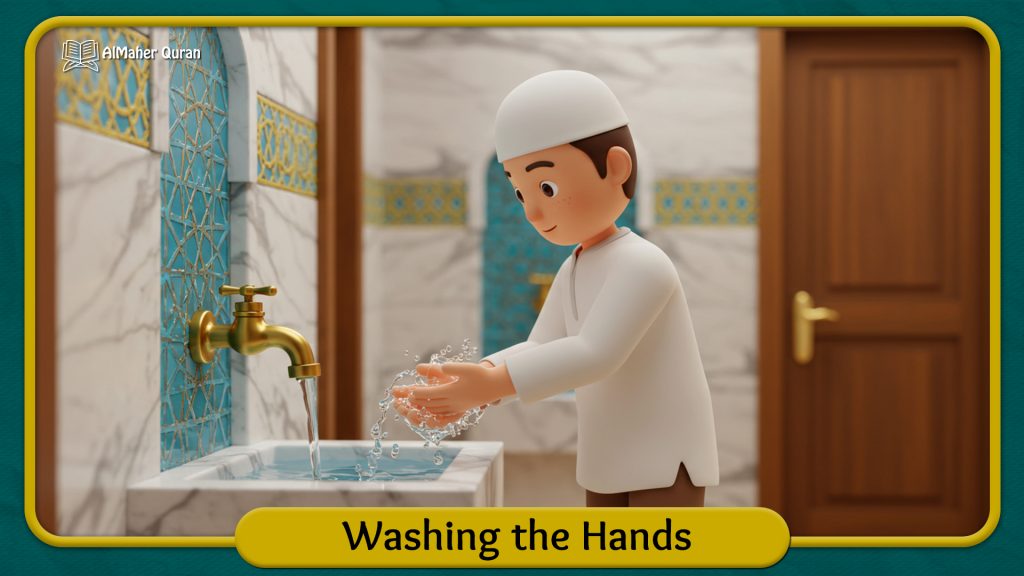
Wash both hands up to the wrists three times, starting with the right.
Ensure water reaches between the fingers and fingertips.
Step 4: Rinse the Mouth:
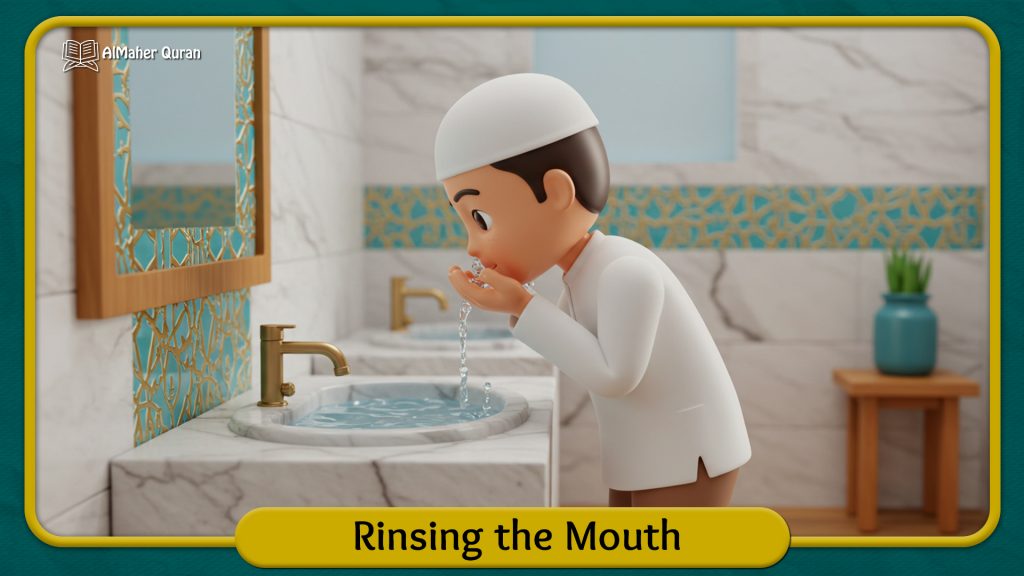
Take water into your mouth, swirl it around, and spit it out three times.
Cleansing the mouth should be done three times for readiness.
This cleanses the mouth and prepares it for reciting the Quran.
Step 5: Rinse the Nose:
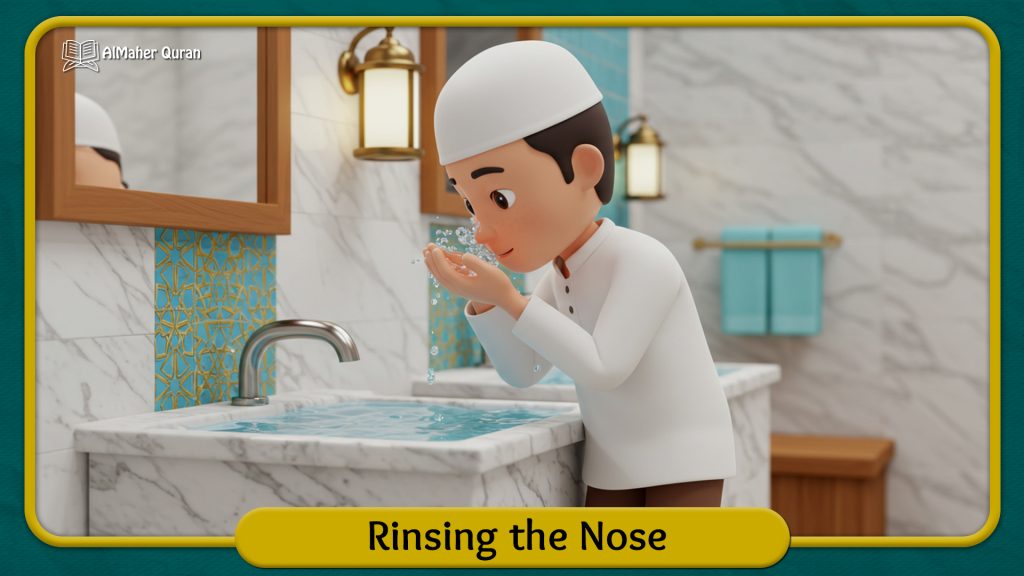
Sniff Water into Your Nostrils Three Times.
Inhale water into your nostrils and then blow it out, using the left hand.
Do this three times to clean the nose.
Step 6: Wash the Face:
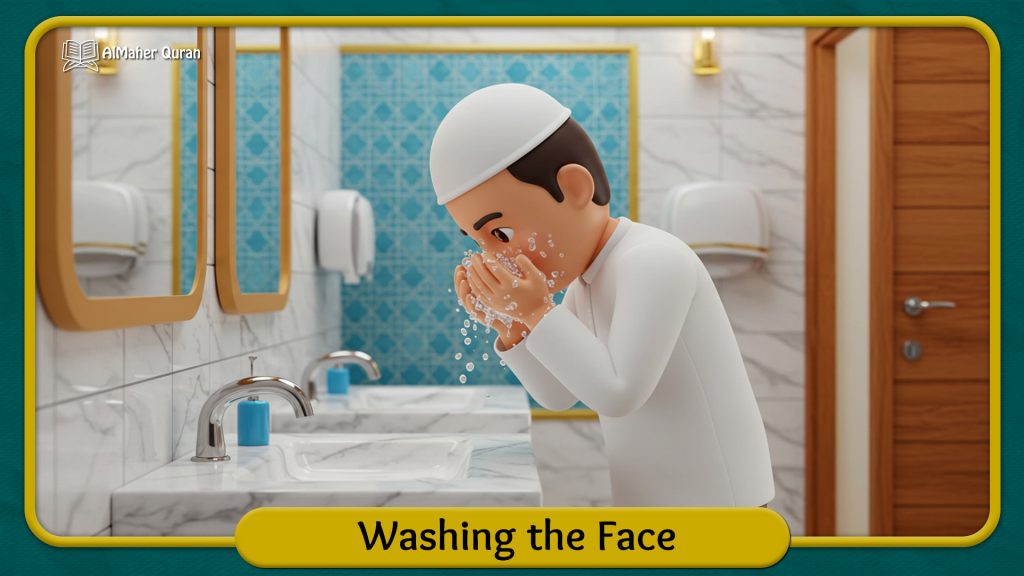
Wash your entire face, from the hairline to the chin, and from ear to ear, three times.
Make sure no spot is left dry.
Step 7: Wash the Arms:

Wash your arms, starting with the right, from hands to the elbows, three times.
Then do the same for the left arm.
Step 8: Wiping the Head:
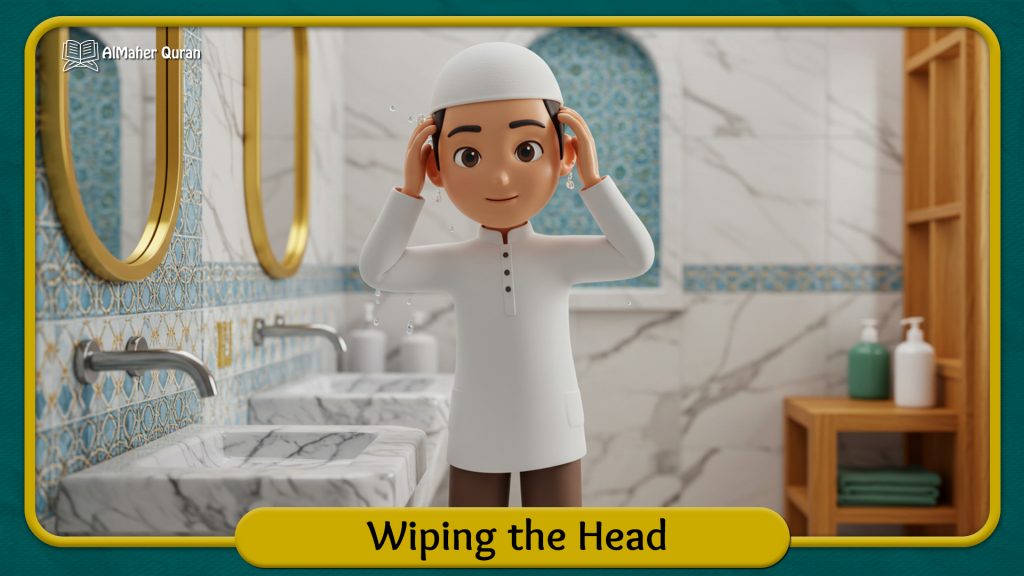
Wet your hands with water and wipe over your head once.
Start from the front of the head to the back and return the hands forward.
Step 9: Wiping the Ears:
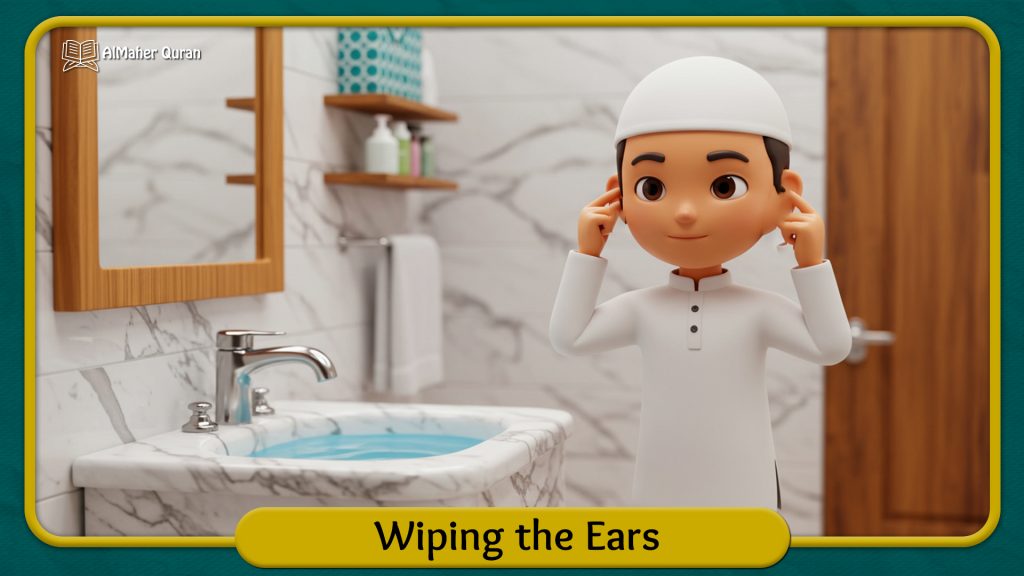
With the same wet hands, use your index finger for the inside and your thumb for the outside.
Step 10: Wash the Feet:

Wash your feet up to the ankles three times, starting with the right, not the left.
These steps form the complete method of ablution.
After finishing, recite the dua (supplication), which we’ll discuss below.
How to Perform Wudu for Females
Wudu for females is the same way as for males, following the same steps and rules.
However, here are some specific tips and considerations for women:
If wearing nail polish, remove it before wudu so water can reach the nail bed.
Ensure sleeves are rolled high enough to allow washing the forearms up to the elbows.
They can wudu in public directly by using a clean space or a women’s mosque section.
If wearing a hijab, it must be removed to properly wipe over the hair.
However, when wearing a tight head covering and in certain scholarly views, a masah can be done over a portion of the head if necessary.
The spiritual purpose and symbolic essence of ablution remain the same: to achieve a state of purification and readiness to pray and connect with Allah.
Dua After Wudu
After completing wudu (ablution), it is Sunnah (recommended) to say the following dua:
“Ashhadu an la ilaha illallah wahdahu la sharika lahu, wa ashhadu anna Muhammadan abduhoo wa rasooluhu.”
(Translation: I bear witness that there is no deity worthy of worship except Allah alone; He has no partners. And I bear witness that Muhammad is His servant and Messenger.)
Another beautiful supplication is:
“Allahumma Aalani minat-tawwabeen waj‘alni minal-mutatahhireen.”
(Translation: O Allah, make me among those who turn in repentance and make me among those who purify themselves.).
These duas not only affirm your belief in Allah and His Messenger but also elevate your intention to a higher spiritual level.
Saying these duas after wudu is a sign of gratitude and enhances your reward.
How to Perform Wudu: A Spiritual Act of Worship
Performing wudu or wudhu is more than just cleaning the body;
It’s a preparation for sacred moments of worship, including salah, and even Eid prayers.
The ritual embodies submission, purity, and readiness to stand before Allah.
If you’re looking to master wudu or teach it to others.
Leading platform AlMaher Quran Academy offers authentic online tutorials, video guides, and one-on-one instruction to ensure your intention (niyyah) is done properly and with the correct intention (niyyah).
Also, we offer Quran Reading Classes Online and arabic courses.
With high ratings and a reputation for spiritual excellence, it’s a great place to start your journey in Islamic learning.
Conclusion
Now that you understand how to perform wudu, the significance it holds, and the proper method, it’s important to practice this act regularly and with full intention (niyyah).
Remember that wudu or wudhu is not just a physical wash, but a spiritual purification that prepares your heart and body for meaningful connection with Allah.
Through each step, from rinsing the mouth, the head, to washing the legs.
You’re engaging in an act beloved by Allah and practiced by millions of Muslims around the world every day.
Stay clean, stay connected, and keep your intention (niyyah) strong.
If you want to learn more about wudu, or Islamic rituals, check out AlMaher Quran Academy, your trusted source for verified Islamic education
